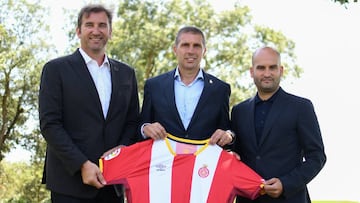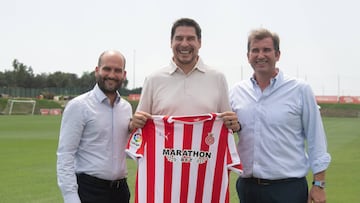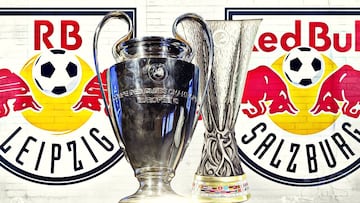UEFA
Could Girona and Manchester City both play in the Champions League?
The Spanish team has moved ahead of Barcelona to become Real Madrid’s main challengers but have complex ties to the Premier League club.

Girona have been the surprise package, for most, in European soccer season and the Catalans are just two points off the top of the LaLiga ahead of crucial clash against leaders Real Madrid on Saturday, prompting football enthusiasts to ponder two crucial questions. Firstly, could they really clinch the title ahead of the behemoths of Madrid, Barcelona, and Atlético? And secondly, if they, at least, remain in the top positions in the standings, as looks likely, would they be able to compete in the Champions League despite sharing ownership with Manchester City, who will almost certainly be there?
The simple answer is yes, they can. But that said, the club would need to convince UEFA to grant permission. Let’s take a more detailed look at the situation.
Real Madrid - Girona: Follow the live action here!
Girona under the City Group umbrella
Girona and City are two of the clubs encompassed by the City Football Group (the Spanish team being acquired in 2017), in which the Emirati-based Abu Dhabi United Group holds an 81% stake, while the remaining share is owned by the American fund, Silver Lake, a major player headquartered in Palo Alto with investments spanning various domains. Additionally, there is a small ownership percentage held by Chinese firms, China Media Capital and CITIC Capital.
During the summer, UEFA opened the door to shared ownership (as of 7 July, a statement was issued) due to the occurrence of multiple clubs with the same owner in European competitions for the 2023-2024 season. V Sports, owned by American Wes Edens and Egyptian Nassef Sawiris, possesses 100% ownership of the English club Aston Villa and a 29% stake in the Portuguese Vitoria Guimaraes. A similar scenario unfolds with British entrepreneur Tony Bloom, who owns the English club Brighton & Hove Albion and holds a minority interest in the Belgian club Royal Union Saint-Gilloise. The American fund, RedBird Capital Partners, exercises control over nearly the entire ownership of the Italian club Milan and holds up to 85% ownership of the French club Toulouse. However, it’s important to note that Gerry Cardinale, the founder of RedBird, and none of the fund’s advisors sit on the board or the executive team of Toulouse. This distinction is key.

In this manner, they avoid breaching UEFA regulations, which state:
“No club, either directly or indirectly, holds or deals in securities or shares of any other club participating in a UEFA club competition; no club is a member of any other club participating in a UEFA club competition; no one has any power whatsoever or is simultaneously involved, directly or indirectly, in any capacity whatsoever in the management, administration and/or sporting performance of more than one club participating in a UEFA club competition; and no one has control or decisive influence over more than one club in a UEFA club competition.”
What change is required for Girona’s Champions League dreams?
The European governing body, presided over by Aleksander Ceferin, granted approval for shared ownership, albeit with certain nuances. It is within these nuances that Girona’s prospects of participating in European competitions lie.
The City Group holds only 47% ownership of the Catalan club, with the remaining shares divided among the Guatemalan entrepreneur Marcelo Claure, who possesses 35%, and other investors. The City Group does not have sole ownership of the club, as the Chairman of the Board is Pere Guardiola (brother of Pep, the manager of Manchester City), and the club’s President is Delfí Geli, a former player of Barcelona, Atlético, Albacete, and Alavés.
Although there are members of the club’s Board of Directors affiliated with City Group, they would simply need to step down from their positions (prior to Girona applying for the European license in the event of qualification) for UEFA to grant its approval.

The remaining UEFA restrictions must also be adhered to by Girona to obtain the definitive approval to participate in European competitions. These include: clubs shall not enter into any form of cooperation, joint technical or commercial agreements, and clubs shall not utilize any shared database of scouts or players. The most significant restriction is that clubs shall not transfer players between themselves, either on a permanent or loan basis, directly or indirectly, until September of the following season (in the case of Girona and City, until September 2025). Therefore, Yan Couto could not continue on loan or sign with Girona, unless such a transfer takes place before the summer. The same applies to Savinho, who is on loan from Troyes and is also part of the City Football Group.
In summary, Girona could indeed coexist with Manchester City in European competitions as long as they demonstrate (by changing the Board of Directors) that no one from the City Group influences decisions within the organization and that there is no exchange, be it commercial or involving players, between the respective clubs.
Precedents with RB Salzburg and Leipzig
UEFA has dealt with similar cases in the past, such as the situation with Red Bull Salzburg (Austria) and Red Bull Leipzig (Germany). Both teams competed in the Champions League this season. UEFA allowed them to coexist in the top European competition because it was argued that Red Bull has its primary headquarters in Salzburg, while in Leipzig, it merely acts as a sponsor.

Something similar occurred in 2020 when AC Milan and Lille met in the UEFA Europa League for the 2020-21 season. Despite conducting an investigation into the involvement of Elliott Management (who were the owners of the Italian club at the time) as creditors within the holding company Melvyn Partners (owners of Lille), UEFA granted approval. Ultimately, the UEFA Club Financial Control Committee found no irregularities.
With Girona comfortably clear of fourth-placed Atlético Madrid and Athletic Club de Bilbao, who are fifth, there appears to be every chance they will compete in the Champions League for the first time in 2024-25. Perhaps a more pertinent question is whether they will do so as reigning Spanish champions?





